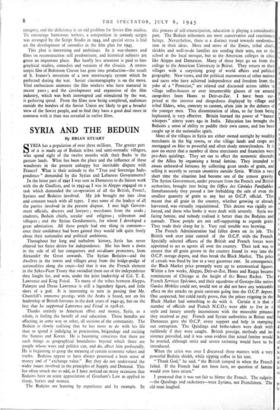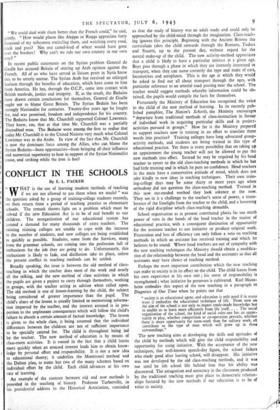SYRIA AND THE BEDUIN
By BRIAN STUART
SYRIA has a population of over three millions. The greater part of it is made up of Beduin tribes and semi-nomadic villagers, who spend eight of the twelve months with their flocks in the pasture lands. What has been the place and the influence of these wanderers in the present unhappy but inevitable dispute with France? What is their attitude to the "True and Sovereign Inde- pendence " demanded by the Syrian and Lebanese Governments?
In the latter part of 1941 I was sent to Damascus to do liaison work - with the de Gaullists, and in 1943-44 I was in Aleppo engaged on a task which demanded the co-operation of all the British, French, Syrians and Beduins involved. My job brought me into close and constant touch with all types. I met some of the leaders of all the parties involved in the present dispute. I met high Govern- ment officials, doctors and lawyers ; merchants from the souks ; students, Beduin chiefs, secular and religious ; tribesmen and villagers ; and the Syrian Gendarmerie, for whom I developed a great admiration. All these people had one thing in common— once their confidence had been gained they would talk quite freely about their nationalist and political ambitions.
Throughout her long and turbulent history, Syria has never abjured her fierce desire for independence. She has been a thorn in the side of all her conquerors and soi-disant protectors, from Alexandef the Great onwards. The Syrian Beduins—and the dwellers in the towns and villages away from the hodge-podge of nationalities along the coast—feel that it was the French element in the Sykes-Picot Treaty that swindled them out of the independence they fought for, and won, under the joint leadership of Col. T. E. Lawrence and King Feisal. To many of the tribes between Aleppo, Palmyra and Deraa Lawrence is still a legendary figure, and little short of a god. It is interesting to note in passing that Mr. Churchill's immense prestige with the Arabs is based, not on his leadership of British fortunes in the dark years of 1940-45, but on the fact that he supported Lawrence and Feisal in 1918-21.
Thanks entirely to American effort and money, Syria, as a whole, is feeling the benefit of real education. These benefits are affecting, in some way or other, all sections of the community. The Beduin is slowly realising that he has more to do with his life than to spend it indulging in procreation, brigandage and reciting the Sunnas and Koran. He is becoming conscious that there are such things as geographical boundaries beyond which there are people whose ways and politics can, and do, affect him profoundly.
He is beginning to grasp the meaning of certain economic values and truths. Beduins appear to have always possessed a keen sense of money and of " exchange value." But they do not understand the wider issues involved in the principles of Supply and Demand. This has often struck me as odd, as I have noticed on many occasions that Beduins have an acute appreciation of Gresham's Law as applied to sheep, horses and women.
The Beduins are learning by experience and by example. In
this process of self-emancipation, education is playing a considerable part. The Beduin tribesmen are most conservative and reactionary beings. Nevertheless, there is a distinct trend towards modernisa- tion in their ideas. More and more of the Emirs, tribal chiefs, shiekhs and well-to-do families are sending their sons, not to the school at the local mosque, but to the -American colleges in cities like Aleppo and Damascus. Many of these boys go on from the college to the American University in Beirut. They return to their villages with a surprising grasp of world affairs and political geography. New views, and the political manoeuvres of other nations and races who have achieved independence and freedom from the yoke of a " Protector," are related and discussed across tables in village coffee-houses or over innumerable glasses of tea around camp-fires from Horns to- Deir-ez-Zor. I -have been sur- prised at the interest and shrewdness displayed by village and tribal Elders, who, contrary to custom, often join in the debates of the younger men. This dissemination of ideas, so far from being haphazard, is very effective. Britain learned the power of " bazaar whispers " ninety -years ago in India. Education has brought the Beduins a sense of ability to paddle their own canoe, and has been caught up in the nationalist spirit.
Most of the villages in•Syria are either owned outright by wealthy merchants in the big towns, or else village lands and crops are mortgaged en bloc to powerful and often shady moneylenders. It is now no secret that a number of these merchants and financiers were pro-Axis quislings. They set out to effect the economic discredit of the Allies by- organising a bread famine. They intended to amass unheard-of fortunes by collecting great stocks of grain, and selling it secretly to certain countries outside Syria. Within a very short time the -siniation had become one of the utmost gravity. The Syrian Government, under pressure from the French and British authorities, brought into being the Office des Ceriales Panifiables. Simultaneously they passed a law forbidding the sale of even the smallest quantity of grain to any but an O.C.P. official. This meant that all grain in the country, whether growing or already harvested, was virtually requisitioned. This decree was rigidly en- forced, and those who broke it were dealt with severely. Syria was facing famine, and nobody realised it better than the Beduins and nomads. These people are not self-supporting- as regards grain. They trade their sheep for it. Very real trouble was brewing. The French Administration had fallen down on its job. The British took over joint control of the O.C.P. with• the French. Specially selected officers of the British and French forces were appointed to act as agents all over the country. Their task was to ensure that all grain grown in the country found its way into the O.C.P. storage depots, and thus break the Black Market. The price of cereals was fixed by law at a very generous rate. In consequence, the Black Market price promptly went up to astronomical figures. Within a few weeks, Aleppo, Deir-er-Zor, Horns and Raqqa became reminiscent of Chicago at the height of the Booze Racket. The French Services Speciaux, and their squadrons of Gestapo-like native Gardes Mobiles could not, would not or did not have any noticeable effect on the attacks on grain caravans going into the O.C.P. depots. One suspected, but cotild rarely prove, that the prices reigning in the Black Market had something to do with it. Certain it is that a number of officials and French N.C.O.s were able to live in a style and luxury utterly inconsistent with the miserable pittance they received as pay. French and Syrian authorities in Beirut and Damascus gave the O.C.P. every support and help in stamping out corruption. The Quislings and bribe-takers were dealt with ruthlessly if they were caught. British prestige, methods and in- sistence prevailed, and it was soon evident that actual famine would be averted, although strict and severe rationing would have to be introduced.
When the crisis was over I discussed these matters with a very powerful Beduin shiekh, while sipping coffee in his tent.
" Thank God," he said, " the British jumped in when the French failed. If the French had not been here, no question of famine would ever have arisen."
I protested that it was not fair to blame the French. The culprits —the Quislings and racketeers—were Syrians, not Frenchmen. The old man laughed.
" We could deal with them better than the French could," he said, grimly. " How would places like Aleppo or Raqqa appreciate forty thousand of my tribesmen encircling them, and watching every toad, track and pass? Not one camel-load of wheat would have gone over the borders! Why can't we rule our own country in our own way? "
In recent public statements on the Syrian problem General de Gaulle has accused •Britain of stirring up Arab opinion against the French. All of us who have served in liaison posts in Syria know this to be utterly untrue. The Syrian Arab has received an enlarged horizon through the benefits of education, which have come to him from America. He has, through the O.C.P., come into contact with British methods, justice and integrity. If, as the result, the Beduins have drawn certain conclusions for themselves, General de Gaulle ought not to blame Great Britain. The Syrian Beduin has been strongly Nationalist for centuries. Twenty-five years ago he fought for, and was promised, freedom and independence for his country. The Beduins know that Mr. Churchill supported Colonel Lawrence. They knew, too, that at that time Mr. Churchill was a partially discredited man. The Beduins were among the first to realise that today Mr. Churchill is to the United Nations very much what Colonel Lawrence was to the Arabs. In view of the fact that Mr. Churchill is now the dominant force among the Allies, who can blame the Syrian Beduins—born opportunists—from bringing all their influence and numerical superiority to bear in support of the Syrian Nationalist cause, and striking while the iron is hot?





























 Previous page
Previous page